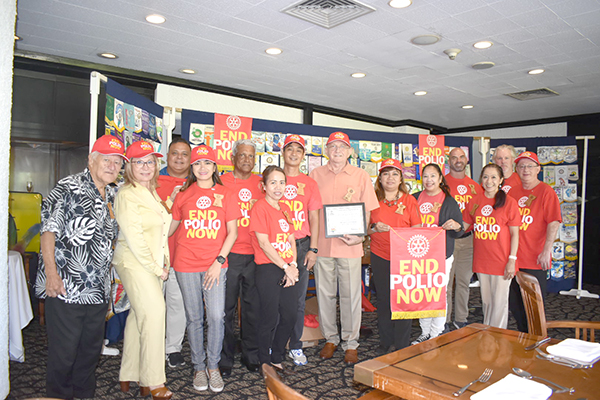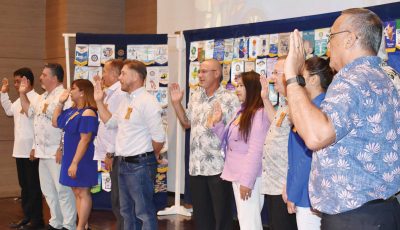Rotary Club donates over $2K to anti-polio efforts

Rotarians pose with their “End Polio Now” shirts last Tuesday after the presentation on polio by Dr. Peter Gregor at the Giovanni’s Restaurant of Hyatt Regency Saipan. Rotarians collectively donated $2,200 to the Rotary International’s PolioPlus, which is tripled to $6,600 by the Bill and Melinda Gates Foundation. World Polio Day was observed on Monday, Oct. 24. (Leigh Gases)
In support of World Polio Day last Monday, Oct. 24, the Rotary Club of Saipan joined the rest of the world in the effort to end polio by donating $2,200 to Rotary International’s PolioPlus program, with the amount being tripled to $6,600 by the Bill and Melinda Gates Foundation.
World Polio Day provides an opportunity to highlight global efforts toward a polio-free world, and to honor the commitment of those on the frontlines of the fight to eradicate polio.
Wendell Posadas, president of the Rotary Club of Saipan, explained at their Tuesday meeting at the Giovanni’s of Hyatt Regency Saipan that their partners in the fight to end polio is led by the Global Polio Eradication Initiative, which includes Rotary International, UNICEF, the U.S. Center for Disease Control and Prevention, the World Health Organization, the Bill and Melinda Gates Foundation, “and governments of the world with the support of many others in the globe.”
Posadas and Rotarians Dr. Peter Gregor and Dr. Ana Maria Gregor led the initial efforts to donate at the meeting and were soon followed by the rest of the Rotarians.
According to the Rotary International’s PolioPlus, their goal has been to eradicate polio for more than 35 years.
“As a founding partner of the Global Polio Eradication Initiative, we’ve reduced polio cases by 99.9% since our first project to vaccinate children in the Philippines in 1979. Rotary members have contributed more than $2.1 billion and countless volunteer hours to protect nearly 3 billion children in 122 countries from this paralyzing disease. …Today, polio remains endemic only in Afghanistan and Pakistan. But it’s crucial to continue working to keep other countries polio-free. If all eradication efforts stopped today, within 10 years, polio could paralyze as many as 200,000 children each year,” states their website.
Dr. Peter Gregor, who was the guest speaker at their meeting, explained what polio is and does—a paralyzing and potentially deadly infectious disease that most commonly affects children under the age of 5. It spreads from person to person via contaminated water and can then attack the nervous system.
In his presentation, Dr. Peter Gregor also stated that the first polio case in nearly a decade was recently reported in New York, but that the end game is “an ambitious $4.8-billion plan to rid the world of polio by 2026. The strategy focuses on vaccinating 370 million children annually against polio for the next five years.”



























